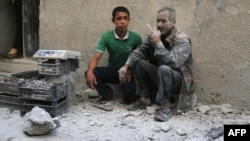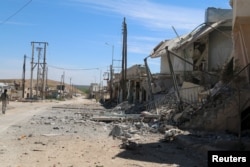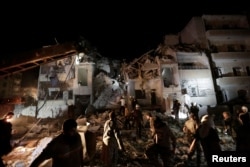While most media coverage of the Syria conflict has focused on the clash of arms, in northern Syria, the uprising against President Bashar al-Assad’s rule has followed two tracks — the military struggle to oust the government and the effort to establish civilian governance in rebel-held areas. Those efforts have frequently come into conflict, with civilians, seeking to provide basic services, struggling to persuade armed groups that there should be a separation of powers.
But in rebel-controlled areas of the city of Aleppo, two sides of Syria’s revolution have cohered more effectively in recent weeks, with less friction between the civilians and the armed groups.
Local activists say the "cessation of hostilities" brokered in February by the U.S. and Russia has helped, despite the fact that it has not been an all-embracing cease-fire. Rebel-held districts in Aleppo city are still pounded by government airstrikes and shelling but with less intensity than before the "cessation of hostilities" agreement.
Relative calm
This has provided some relative calm, allowing shops to open and an increase in civic activity, says Eyad Kalloul, a development worker with the Muwatana, a pro-opposition but independent Syrian NGO that helps facilitate dialogue between militias and civilians.
The local city council in Aleppo is one of several hundred councils functioning in rebel-held towns and villages across Syria, some elected in rudimentary-run polls, others not. It has made significant progress in gaining control from the armed groups of much of the governance of insurgent-held districts, including distribution of humanitarian aid and organizing basic public services, Kalloul says.
Kalloul, a father of two, cites as a recent example the control of a neighborhood water well.
“We asked why the well should be controlled by a militia instead of the council,” he says. “And after negotiations involving local notables as well, the militia agreed.” He adds: “The aim is to get all civil services under civilian control.”
Assistance getting organized
Many of the councils in rural Aleppo, rural Idlib and some areas in the countryside of Latakia, as well as in rebel-controlled towns ringing Damascus, originated as local relief efforts. They grew mainly from the grass roots and were quickly encouraged by Western governments, who saw their development as a major civil breakthrough.
Western officials hope the councils can help to nudge the ideological direction of the rebellion, tempering its sectarianism and curtailing the power of radical Islamists by building up popular support for secular local governance.
Progress defining areas of civilian responsibility — from the provision of water and electricity to health care and education — has been easier in the city of Aleppo thanks to the recent departure of fighters with Jabhat al-Nusra, the al-Qaida affiliate that is the most reluctant of the armed groups in northern Syria to relinquish any power to civilians, a reflection of the jihadists’ theocratic beliefs.
According to Gen. Salim Idris, former chief of the staff of the Western-backed Free Syrian Army, al-Nusra has withdrawn many fighters from Aleppo, fearing it could suffer major losses if the government, backed by the Russians, do mount a major assault on rebel districts.
“Al-Nusra is always thinking several moves ahead,” he says.
In neighboring Idlib province, civilians have been much more restricted in what they can do. Foreign donors have been reluctant to provide funds for civilian projects there, from reconstruction to relief services, fearing al-Nusra entanglement.
Civilians and civil defense members look for survivors at a site damaged after suspected Russian airstrikes on the Syrian rebel-held city of Idlib, Syria, late May 30, 2016. The strikes killed at least 50 people and left dozens more injured.
Nusra leaders won’t even sit with civilian negotiators, leaving that to an allied Islamist faction, Ahrar al-Sham, says a European aid worker who oversees dialogue efforts in Idlib from Turkey. He asked not to be identified, citing the political sensitivity of the dialogue attempts. Meanwhile, there are growing signs that al-Nusra might be about to announce an emirate in Idlib.
Lessons from prison
“Al-Nusra doesn’t want to talk to us because we are secular,” says Kalloul, speaking in English, which he learned as a detainee in Syria’s notorious Sednaya prison by listening to VOA on a smuggled radio.
A one-time Communist, he says English wasn’t the only thing he learned during his five years in jail. Debating in prison with other detainees, reading and being exposed to news from around the world, his political views changed.
He now describes himself as a liberal, but says prison debates equipped him with the skills that now help him to facilitate talks between civilians and armed militias that hold opposing political views.
Setting up a justice system in the rebel-held areas has proved difficult.
”Justice is much more complicated than who oversees the provision of basic services and even education,” Kalloul explains. In different districts, there are different and often competing courts. “Civilians have asked for a unified court system across rebel-held areas and one controlled by civilians and not the armed groups,” he says.
They have also called for Unified Arab Law to be adopted as the legal code.
Unified Arab Law is a compromise between Syrian state law and religious Sharia law that is being developed by jurists and the Arab League. But here, too, interests compete; militias have proven reluctant to give up their courts and Islamist groups are adamant that Sharia law should be followed.






